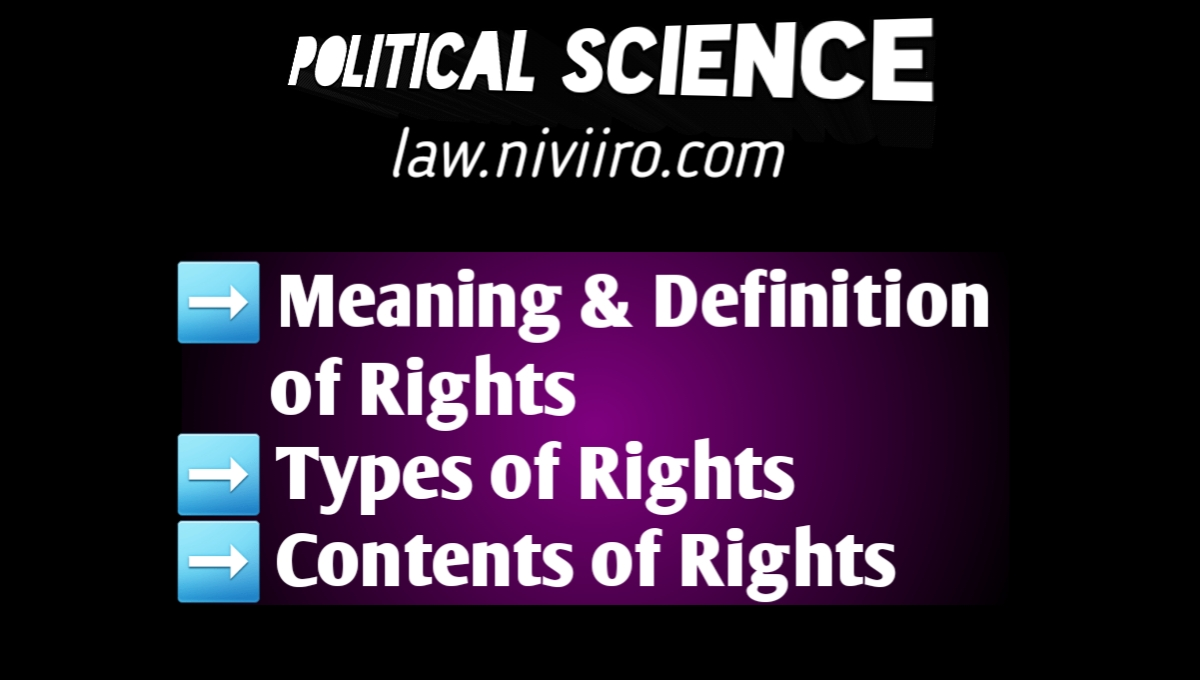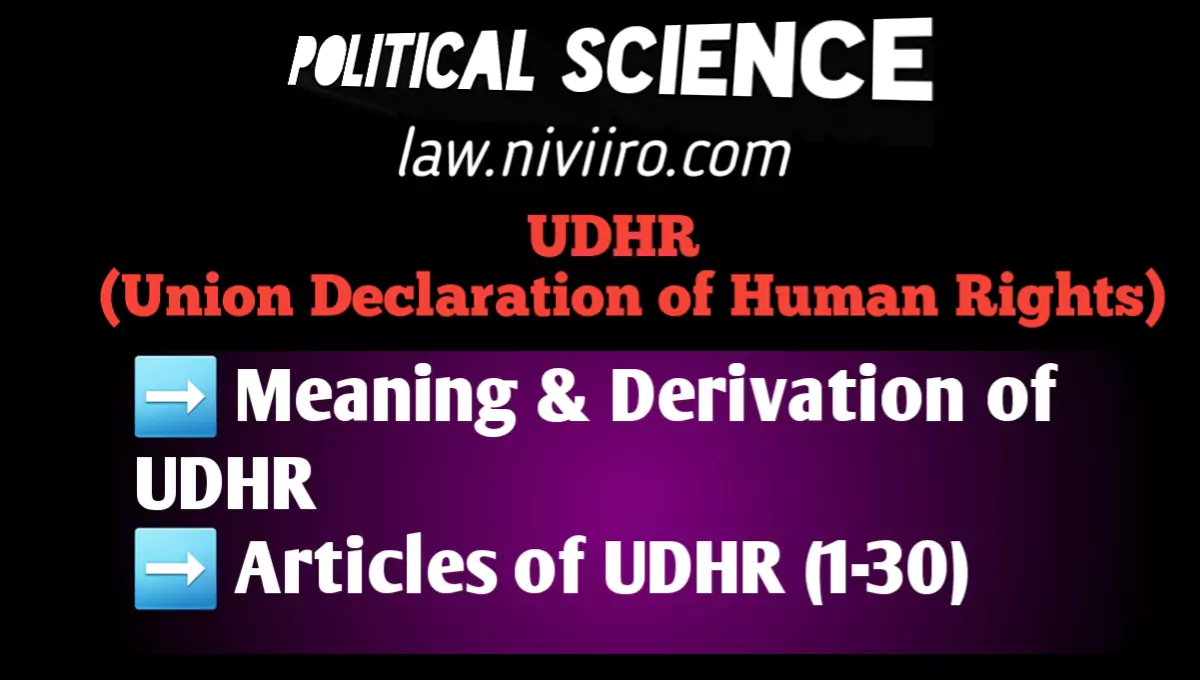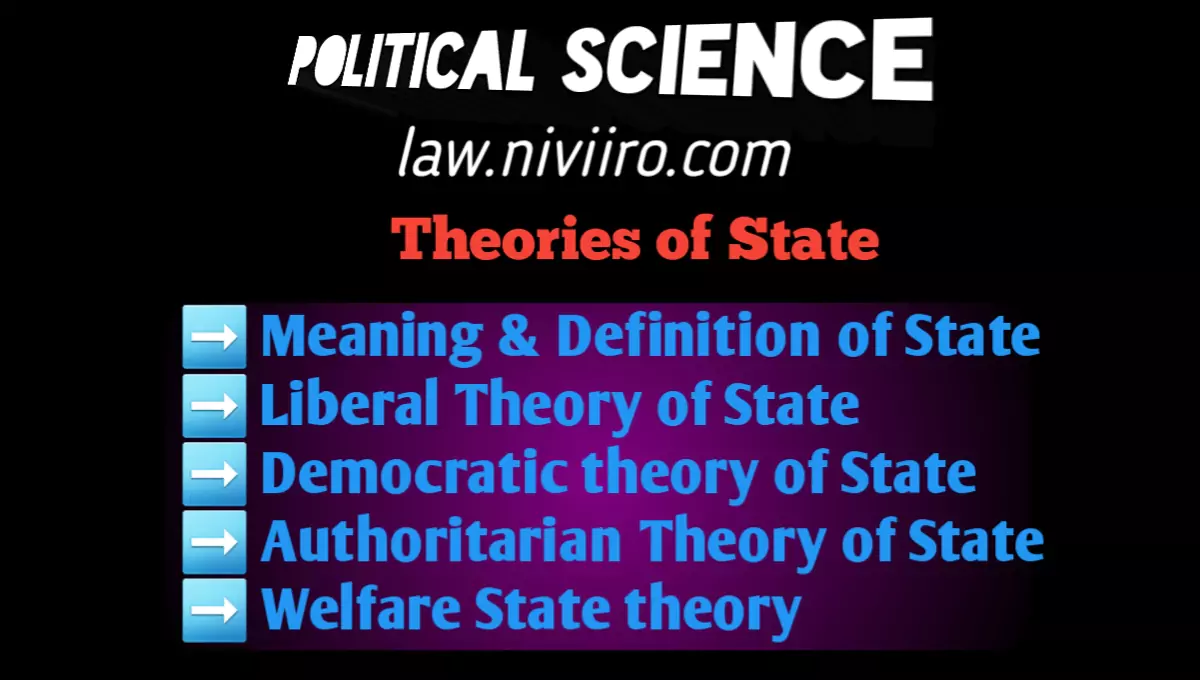“State is known by the rights that it maintains”, says Prof. Laski. The state should ensure that individuals have access to a set of basic human rights that are necessary for a happy life. As Hobbes puts it, “rights are.” “what we may expect from others, and others from us, and all genuine rights are social welfare conditions.”
Thus, the rights that anyone may claim are partially those that are required for every man to be a national human being, and partly those that are required for him to perform the duty that society expects of him. They are influenced by and related to his social obligation. A lot of political thinkers have defined rights.
Definition’s of Rights
Some of the important definitions are given below :
- According to Sri Niwas Shastri, “In its essence a right is an arrangement. rule, or practice sanctioned by the law of the community and conducive to the highest moral good of the citizen”.
- “Rights are those conditions of social life without which no man can seek to be himself at his best”.-Laski.
- “Rights are a reasonable claim to freedom in the exercise of certain activities”-Wilde.
- Hobbhouse says, “Rights are what we may expect from others, and others from us, and all genuine rights are conditions of social welfare. Thus, the rights anyone may claim are partly those which are essential to every man in order to be a rational human person, and partly those which are necessary for the fulfilment of the function that society expects from him. They are conditioned by. and correlative to his social responsibilities”.
- “Rights are one man’s capacity of influencing the acts of another by means of the opinion and force of the society”.-Holland.
Classification of Rights
There is a clear distinction between rights and powers. In the wild, beasts have powers rather than rights. Man’s powers cannot be termed rights if they are not recognised by society and are not exploited for the common good. Social acknowledgment and state guarantees enable man’s powers to take the form of rights. In fact, all meaningful rights are social welfare requirements. They are the whole of the opportunities that enable the enrichment of an individual’s personality. As a result, they constitute the fundamental prerequisites of man’s good living and social welfare.
The following table shows the classification of rights:
- Natural rights
- Moral rights
- Legal rights
Natural rights
By natural rights, we mean those that people had before to the creation of the state. People had these rights while they were in their natural state. John Locke was of the opinion that in the state of nature people enjoyed the right to life, the right to property and the right to freedom. Many political thinkers consider natural rights to be God-given rights. Political intellectuals today disagree with this viewpoint. They believe that prior to the formation of society or the state, people did not have such natural rights.
Moral Rights
These rights are based on man’s ethical feelings and are not protected by any legal authority. For example, parents have the right to be aided in their old age by their children. And if their children do not serve or aid them in their old age, they are unable to seek the assistance of any order of law.
Legal Rights
Legal rights are those that are bestowed to man by law and are protected by law. In our country, for example, everyone has the right to life and property. And if a powerful individual attempts to usurp these rights by the use of force, he may face legal action. Women now have the legal right to inherit their ancestors’ property. They have the legal right to divorce in certain circumstances.
Legal rights are further classified as Fundamental, Political, and Social or Civil Rights.
Fundamental Rights
People’s fundamental rights are guaranteed in India, Japan, the United States, the Soviet Union, France, Switzerland, and many more countries. By fundamental rights, we mean those that constitute the necessary conditions for a good existence and the essentials of human growth. Human personality development and progress are impossible in the absence of fundamental rights. They are inscribed in the constitutions of democratic countries to ensure their inviolability by subsequent governments. Because the courts are subordinate to the dictators under dictatorships, they cannot provide effective protection to civilians against the government’s arbitrariness. The Indian Constitution guarantees people’s fundamental rights.
People in India have the right to equality, liberty, religious freedom, and access to education and culture. If the fundamental rights of any other citizen on the government are usurped by force, the individual concerned might seek assistance from a court of law.
Political Rights
Political rights are those that allow an individual to participate in the political life and affairs of the country as a citizen. People have certain political rights in India, the USSR, the United States, West Germany, Japan, Italy, Belgium, France, the Netherlands, Canada, Australia, and many other democratic countries across the world.
These rights are :
- Right to contest elections.
- Right to criticise the government
- Right to petition.
- Right to vote.
- Right to public office.
Social Rights (Civil Rights)
Social rights are ensured to the people for the progress of mankind and the welfare of society.
These rights include :
- Right to life and security
- Right to religion
- Right to liberty and free movement
- Right to property
- Right to education
- Right to contract
- Right to family
- Right to speech
- Right to equality
- Right to work
- Right to association, etc.
Contents of Rights (No Rights without society)
- The state does not create rights. It merely recognises, maintains, and coordinates them so that everybody may enjoy the advantages of such rights and, in the event of infringement, may safeguard them. As a result, the state guarantees equal rights to all of its citizens.
- Rights should not be ambiguous, but rather specific, so that they do not cause frequent squabbles in society.
- Rights are thus socially recognised claims to make life happier, contented, peaceful, and prosperous. They are superior to the State because they provide the basic necessities of social life. As a result, rights can only exist in society, and there can be no rights without society.
- The rights tend to expand in tandem with the society’s rising requirements.
- Rights are not a selfish claim made by anyone on society. The utilisation of everyone’s right is consistent with the public interest. Nobody can assert his or her right if it jeopardises the overall welfare of society. When I demand my rights, I serve the public interest by guaranteeing to others what I claim for myself.
- Rights and responsibilities are linked. Every right is accompanied by a duty. “Rights without duties are like men without shadows: they only exist in fairy tales,” it has been stated.
- Rights are not unlimited. On the contrary, they are to be used by all citizens while respecting the rights of others. They are founded on the application of intelligence and good behaviour. Nobody has the authority to promote evil in society.
Related Post
Define “Right” ?
According to Laski, “Rights are those conditions of social life without which no man can seek to be himself at his best”.
What are the three types of Rights ?
The following table shows the classification of rights:
1. Natural rights, 2. Moral right, 3. Legal rights
Meaning of ‘Natural rights’ ?
By natural rights, we mean those that people had before to the creation of the state. People had these rights while they were in their natural state.
Meaning of ‘Moral Rights’ ?
These rights are based on man’s ethical feelings and are not protected by any legal authority. For example, parents have the right to be aided in their old age by their children.
What do you mean by ‘Legal Rights’ ?
egal rights are those that are bestowed to man by law and are protected by law. In our country, for example, everyone has the right to life and property.
Meaning of ‘Political Rights’ ?
Political rights are those that allow an individual to participate in the political life and affairs of the country as a citizen.
References
- Prof. S.L. Verma, Modern Political Theory
- M.P. Jain, Political Theory liberal and Marxiam
- Prof. H.C. Verma, Modern Political Theory
- R.C. Agarwal, Political Theory
- V.D. Mahajan, Political Theory
- J.C. Johari, Political Science

















